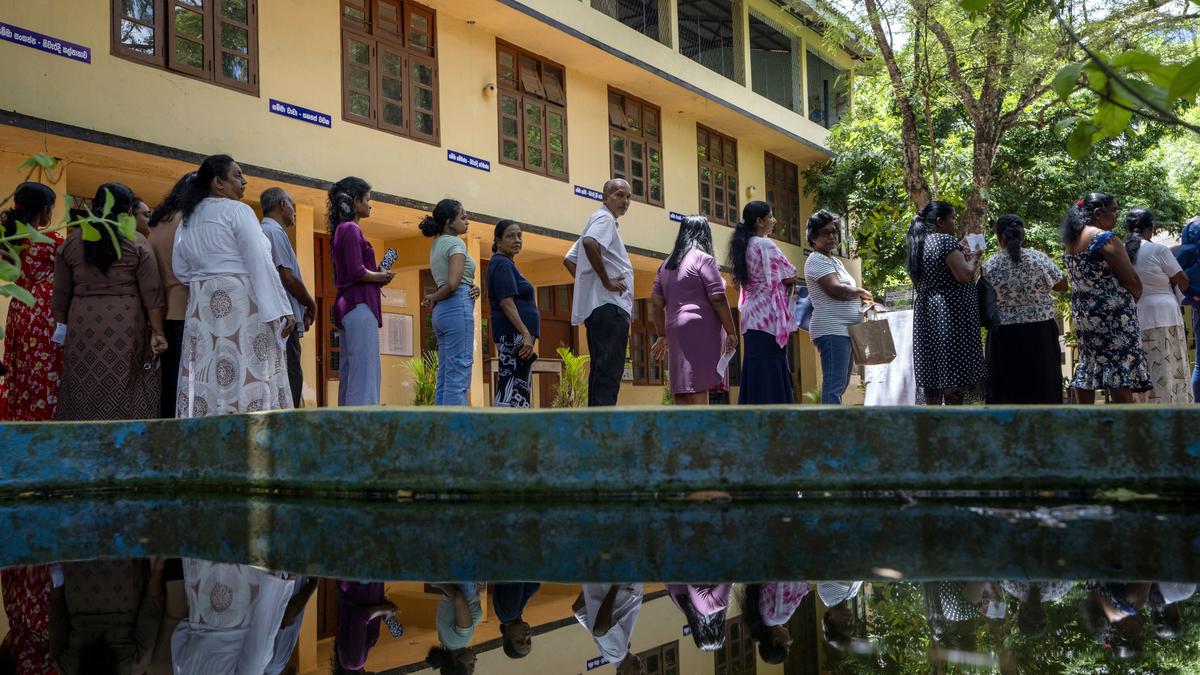People wait in a queue to cast their votes at a polling center during the Presidential election on the outskirts of Colombo, Sri Lanka on Saturday (September 21, 2024).
| Photo Credit: AP
Sri Lankans gave their mandate to the country’s next leader in a peacefully held Presidential election on Saturday (September 21, 2024). The outcome of the critical election, expected on Sunday (September 22, 2024), is watched closely as the island nation navigates a challenging phase of economic recovery following a crushing crisis two years ago.
While an announcement of the official voter turnout is awaited, the People’s Action for Free and Fair Elections, a local election observer group, said it was likely to be in the range of 75% to 80%. The last Presidential election in 2019 saw a record voter turnout of 83.72%.
The election assumes significance, for it is the first time citizens had a say in determining the country’s leadership after a historic people’s uprising in 2022 forced former President Gotabaya Rajapaksa to flee the country and quit office, at the height of the crippling meltdown.
Departing from past Presidential polls that had two main candidates and one clear winner, this election was marked by a three-way contest. Senior politician and incumbent President Ranil Wickremesinghe, who replaced Mr. Gotabaya through a parliamentary vote in 2022, sought a mandate to continue his project of reviving the country’s battered economy. His main rivals from the Opposition, Sajith Premadasa and Anura Kumara Dissanayake, ran on a plank of “change”, offering relief from the burden of the government’s ongoing, IMF-led reform programme.
‘Honest President’
Sarojini Kadirgamar (97) turned up early on Saturday (September 21, 2024) at the College House, a more-than-a-century-old building serving as the administrative block of the University of Colombo, in an upmarket neighbourhood in the capital city. “Today will be the last time I am called upon to do my civic duty. I am voting for an honest President who will end corruption, because all the mantras that put our economy right will count for nothing if we are not honest and corruption-free. We must respect the rule of law; there must be justice for all the citizens of this country,” she said.
In a reference to the lingering inequality felt by the country’s Tamil minority, Ms. Kadirgamar, who has seen every national election since Independence, said, “In other countries, an immigrant is allowed to be President. In this country, [you can’t] unless you are Sinhala Buddhist… even if you are a Tamil who has served this country well, it is not accepted. So, I want someone who will respect the rule of law and the Supreme Court and rule us justly and correctly, the Buddhist way.”
Eliminating corruption has been a running theme for voters ahead of this election. It takes off from a popular chant during the mass agitations of 2022, when citizens blamed the “corrupt” political establishment for their misery and demanded a “system change” so the country could course-correct.
Citizens contending with the enduring impact of the crisis are emphatic about the need for change at the country’ helm. The country’s economic woes have not ended, said Azar, a voter. “See the long lines of people waiting at the passport office [hoping to leave the country for jobs elsewhere] … it is clear that the problems are still there and there is no relief. We need a good leader to come and address our problems,” he said, outside a polling station in Maradana, a Colombo suburb.
The Election Commission of Sri Lanka said counting of postal votes began on Saturday (September 21, 2024) evening, and the final result would likely be out on Sunday (September 22, 2024). A candidate needs to secure 50% plus one vote to be declared the winner. If no candidate garners a majority, which is more likely in a three-cornered race, authorities will undertake a second round of counting, to determine the preferential votes secured by the top two candidates, and add it to their respective count.
In Sri Lanka’s preferential voting system, voters get to mark three candidates on the ballot indicating their order of preference. No election outcome in the past has warranted a second round of counting.
Published – September 21, 2024 09:41 pm IST
